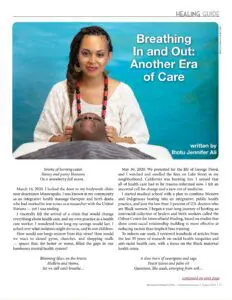NWHSU chiropractic student details her vision for integrative care in MN Women’s Press

The piece details her vision for integrative care through expressive language and a critique of the history of the American healthcare system through the perspective of a Black health care worker. The piece is informative and artistic, with an emphasis on the stark contrast of modern medicine compared to the holistic methods originating from Indigenous healing practices, as well as calling attention to the racial disparities that persisted (and still persist today) with the advancement of the biomedical model of medicine and impact of the 1910 Flexner Report:
“As a direct result of the Flexner Report, five of the country’s seven Black medical schools closed. A 2020 study estimated that if all Black medical schools had remained open, the U.S. could have up to 35,000 more Black doctors today. This would nearly double the current figures — from 5 percent of U.S. doctors to nearly 9 percent.”
Her article challenges the present influences and consequences of white supremacy culture in medicine, and offers an illustration of what the future of integrative care could look like with more tenderness, wisdom and time for patients:
“Here exists a tender, motherly relationship between doctors and their patients. In this era, the doctor brings their wisdom about the body, and the patient brings knowledge of her symptoms, her story, and her priorities. The doctor is a consultant, offering a menu of options, and a teacher, from the Latin word docere ‘to teach,’ helping their patient learn and make choices. The doctor is calm, unrushed, and trusts that their patient knows best.”
As a response to the murder of George Floyd in her neighborhood (and while a NWHSU student), Ihotu brought together over 20 community healers and integrative healthcare workers in interracial dialogues and retreats to explore the possibilities of healing across race, learning and reclaiming Indigenous traditions from all cultural lineages. That work recently led to the opening of the Oshun Center for Intercultural Healing a new health center located inside the Integrative Health Wing of the Family Tree Clinic in Minneapolis.
As director of the Center, Ihotu works with a team of Black, Indigenous, people of color, and LGBTQ+ practitioners, birth workers and apprentices to offer a range of holistic and trauma-informed services including massage, cupping, steams, abdominal therapies, energy work and wellness coaching. The Oshun Center also offers a monthly membership called the Sweet Water Alliance for professionals to receive curated training in implicit bias, equity tools, and collective trauma healing to strengthen our families, communities, professions and healthcare practices.
Ihotu shared with us about why she chose chiropractic, and how she balances being a student and director of an integrative health care clinic:
“I returned to school after the murder of George Floyd in 2020 — over a decade into my career in public health and birth work — because my community needs more doctors. We all need doctors who know our stories, who can relate to our physical and soul pain, and who know our ways of healing. I love chiropractic for its blending of science and mystery, and its historical fight to use evidence to protect holistic care and make sure it stays accessible to the public. I’m moving slowly through the program to protect my mental health, but it’s worth it! I can’t stop living life or press pause on my community during this time. This is not just a job, this is my path, and I hope our work at Oshun Center inspires the next generation of health care workers and patients to ask for more — for true care — from the systems around us.”
- Learn more about Ihotu and the Oshun Center for Intercultural Healing
- Sign up for the Oshun Center Newsletter
- Contact the Oshun Center: oshuncenter@familytreeclinic.org
